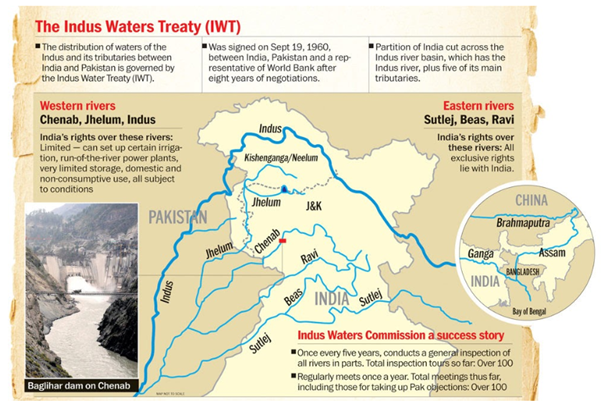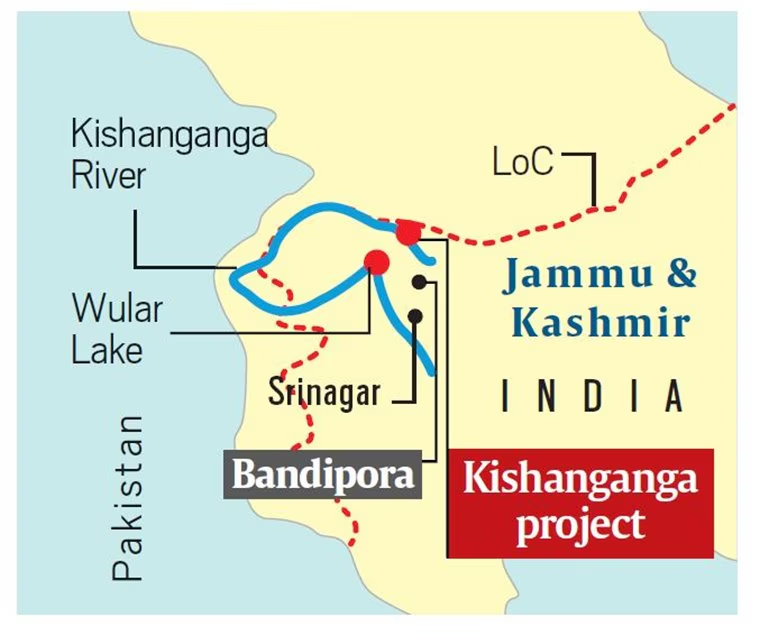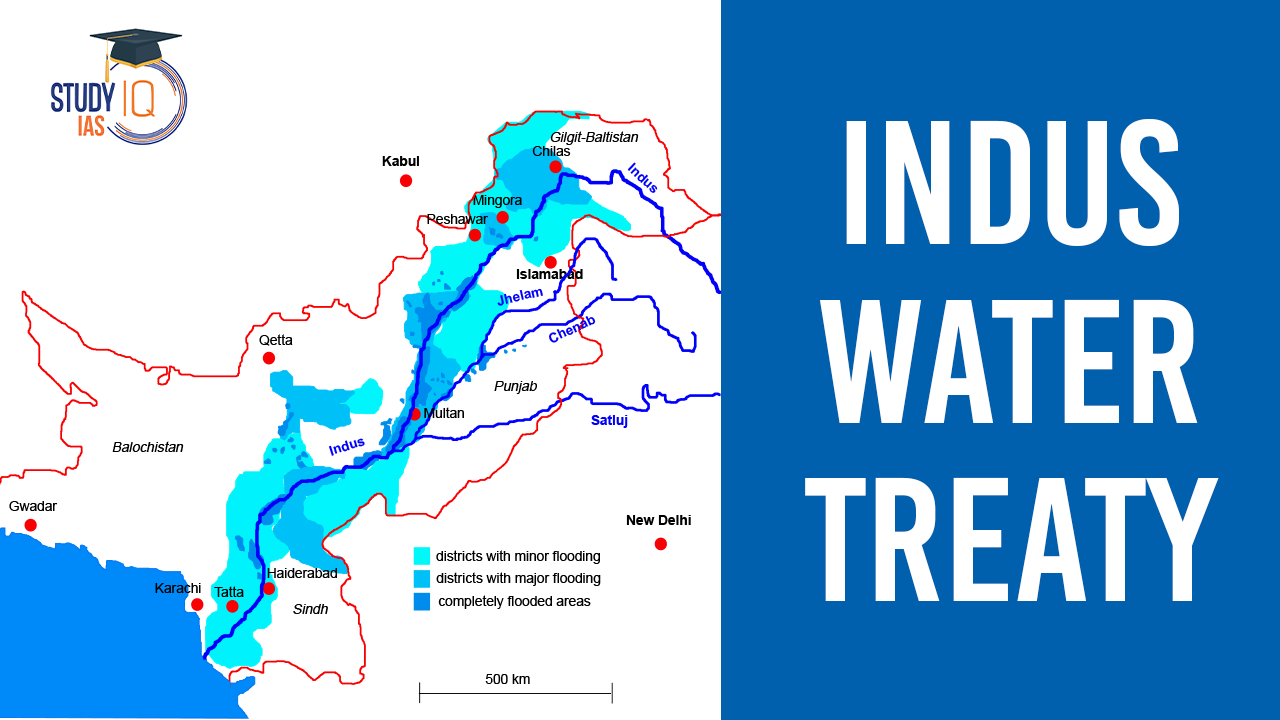Table of Contents
Context: In the wake of the Pahalgam terrorist attack, the Cabinet Committee on Security (CCS) has decided to suspend the Indus Water Treaty. India has decided to put the Indus Waters Treaty on hold, as announced by Foreign Secretary Vikram Misri. The move comes in response to the April 22, 2025, to the recent deadly Terror Attack in Pahalgam on civilians, the worst in the region in years.
The treaty will remain suspended until Pakistan takes credible and irreversible steps to end its support for cross-border terrorism, Misri stated during a press briefing in New Delhi. This action deviates from the 64-year-old pact, which has withstood past tensions, and marks a significant increase in tensions.
| India Takes Strong Measures against Pakistan after the Pahalgam Terror Attack |
|
World Bank Responds to India Suspending Indus Water Treaty with Pakistan
India’s decision to put the Indus Waters Treaty (IWT) on hold in the wake of the Pahalgam terror incident has drawn concern from the World Bank, a signatory to the treaty. On 27th April 2025, according to a World Bank representative, the World Bank is a “signatory to the treaty for a limited set of defined tasks” and “doesn’t opine on treaty-related sovereign decisions taken by its member countries. ”
According to this recent response, the World Bank views India’s choice to suspend the treaty as a sovereign affair, even though it was instrumental in mediating the IWT in 1960 and has a procedural role in resolving disputes.
Historical Context of the Indus Water Treaty
- The Indus Water Treaty was signed on September 19, 1960, after nine years of negotiations facilitated by the World Bank.
- It allocates water from the Indus River and its tributaries, giving Pakistan control over approximately 70% of the water while India retains about 30%.
- The treaty was previously regarded as a successful model for international water-sharing agreements, with India winning disputes regarding projects like the Baglihar Dam (2007) and addressing concerns over Pakistan’s Neelum project (2013).

Water Distribution Under the Indus Water Treaty
India has “unrestricted use” of three Eastern Rivers: Beas, Ravi, and Sutlej.
Pakistan controls three Western Rivers: the Indus, Chenab, and Jhelum.
This distribution grants India only around 20% of the total water flow from the Indus River System, with the remaining 80% going to Pakistan.
- Article III (1) mandates that India must allow the flow of Western River waters to Pakistan. It allows India to use the western river for limited use as follows:
- Limited irrigation purpose
- run-of-river projects
- Storage for flood control up to 3.75 MAF
- non-consumptive purposes, such as for industrial use, drinking water, and other domestic purposes,
- At the same time, the Treaty allows each country certain uses of the rivers allocated to the other.
Recent Developments and Dispute of Indus Water Treaty

Three-stage dispute resolution mechanism under Indus Water Treaty (1960)
- Permanent Indus Commission (PIC): The first level of dispute resolution, where either party informs the other of their plans for the Indus River.
- Neutral Expert: The World Bank appoints a neutral expert to resolve any differences.
- Court of Arbitration: If either party is not satisfied with the neutral expert’s decision, or if there is a dispute over the treaty’s interpretation, the matter goes to a Court of Arbitration.
- The World Bank appoints the chair of the Court of Arbitration.
Neutral Expert’s Decision
- The Neutral Expert validated India’s position that the seven questions referred to him fall under his jurisdiction per Paragraph 7 of Annexure F of the treaty.
- This aligns with India’s consistent claim that only the Neutral Expert has the competence to decide these issues.
- The decision marks the beginning of the merits phase, which will evaluate the specific technical differences and lead to a final decision

Hydroelectric projects objected by Pakistan
- Kishanganga HE Project (330 MW):
- It is a run-of-the-river project in Bandipora (Jammu and Kashmir).
- River Kishanganga is a tributary of Jhelum.
- It requires diverting water from the Kishanganga River through the tunnel to a power plant.
- Rattle HE Project (880 MW):
- It is also a run-of-river hydroelectric power project in Kishtwar District of Jammu and Kashmir.
- It is constructed on the Chenab River.
Ongoing Disputes
- Hydroelectric Projects: The dispute centres on two hydroelectric projects in Jammu and Kashmir:
- Kishenganga Hydroelectric Project (HEP) on the Kishenganga River (a tributary of Jhelum).
- Ratle HEP on the Chenab River.
- Pakistan’s Objections: Pakistan objects to these projects’ design features, claiming they violate the Indus Water Treaty.
- Despite being “run-of-the-river” projects that do not obstruct river flow significantly, Pakistan argues that they could affect water availability.
- Neutral Expert Appointment: In 2015, Pakistan requested a Neutral Expert to address its technical objections, but later retracted this request in favour of adjudication by the Permanent Court of Arbitration (PCA).
- India insisted on referring the matter to a Neutral Expert instead.
India’s Latest Notice
- In a formal notice issued on August 30, 2024, India cited “fundamental and unforeseen changes” necessitating a reassessment of treaty obligations under Article XII(3).
- This article allows for modifications through mutual agreement.
Key concerns include
- Changing population demographics.
- Environmental issues are exacerbated by climate change.
- The need for clean energy development to meet emission targets.
- Ongoing cross-border terrorism is impacting national security.
Political Dynamics Between India and Pakistan
- The current political climate between India and Pakistan is marked by increased tensions, with leaders using more aggressive rhetoric than in previous decades.
- Prime Minister Modi’s statement post-2016 Uri attack that “blood and water cannot flow together” exemplifies this shift.
Impact on Bilateral Relations
- There is a notable lack of political engagement or trade between the two nations, with the 2021 Line of Control (LoC) ceasefire agreement now at risk due to rising terror attacks.
- The potential for reopening treaty discussions exists, particularly in light of Pakistan’s invitation to attend the SCO Heads of Government meeting on October 15-16, which could serve as a platform for dialogue.
Need for Treaty Revisions
Experts argue that the Indus Water Treaty requires updates to address modern challenges:
- Climate change impacts necessitate new frameworks for water management.
- The treaty’s provisions do not account for modern hydropower technologies that enhance efficiency.
- Enhancements are needed to resolve disputes effectively between states within each country.
Implications for Future Relations
- Ongoing Tensions: The relationship between India and Pakistan remains strained, with minimal diplomatic engagement.
- The Neutral Expert’s decision may provide a framework for resolving technical disputes while avoiding escalation to arbitration.
- India’s Notice for Modification: In January 2023, India issued a notice to Pakistan seeking “modification” of the Indus Water Treaty due to Islamabad’s repeated objections.
- This marked a significant development as it was the first notice of its kind in over six decades.
- India’s intent to review and potentially renegotiate aspects of the treaty reflects changing demographics, environmental concerns, and developmental needs.
- Future Considerations: Experts suggest that India’s notification highlights “fundamental and unforeseen changes” necessitating a revisit of treaty terms. These include population growth, environmental issues, and cross-border terrorism impacts.
Other Issues related to Indus Water Treaty (IWT)
- India’s Notice for Modification: In January 2023, India issued a notice to Pakistan seeking “modification” of the Indus Water Treaty (IWT) due to Islamabad’s repeated objections.
- This marked a significant development as it was the first notice of its kind in over six decades.
- Article XII (3) of IWT notes that “provisions of the Treaty may from time to time be modified”.
- India objected to the process of resolving the differences. It questioned the World Bank (WB), the mediator of the IWT, for allowing both the NE and CoA processes to run simultaneously, instead of subsequently.
- India’s intent to review and potentially renegotiate aspects of the treaty reflects changing demographics, environmental concerns, and developmental needs.
- Outdated Treaty: More than 60 years have passed since treaty ratification, but it is not been modified to adopt the evolving concern.
- In August 2021, a Parliamentary Standing Committee in India recommended modifying the IWT given new variables that impact water resources management, such as climate change, global warming and advanced knowledge and technologies that did not exist when the Treaty was signed.
- Unfair arrangement favouring Pakistan: About 20% of the water of the Indus River system has been allocated to India, amounting to 33 million acre-feet (MAF), for its exclusive use. The remaining 80%, amounting to 135 MAF, is allocated to Pakistan.
- Violation to the provision of IWT by Pakistan: Pakistan has violated the graded mechanism of the grievance redressal. Pakistan sought to resolve matters via a Neutral Expert in 2015, but the very next year took the path of CoA. This is tantamount to Pakistan breaching Treaty procedures and declaring it a dispute unilaterally.
- Non-utilisation of the western rivers: Pakistan has raised constant and repeated objections over projects that India has either implemented or plans to implement on the Western Rivers.
- Kishenganga, Ratle, Pakal Dul, Lower Kalnai, etc., are among some of the projects where Pakistani objections over designs are stopping India from taking out the run-of-the-river (RoR) projects to generate hydroelectricity, a right that India has under the Indus Water Treaty (IWT).
- With these objections, out of an estimated power potential of about 20,000 MW, which could be harnessed from western rivers’ power projects, only a capacity of 3,482 MW has been constructed so far by India.
What after the Neutral Expert decision
- Avoiding the Arbitration
- The Neutral Expert’s decision may provide a framework for resolving technical disputes while avoiding escalation to arbitration. The World Bank may have to give in to taking the CoA route after the NE has given its views.
- Way for modification to treaty: Modification in the treaty is the need of the hour to meet the evolving challenges like global warming, parity in water distribution and more robust grievance redressal.


 National Technology Readiness Assessment...
National Technology Readiness Assessment...
 Justice Mission-2025: China’s Live-Fir...
Justice Mission-2025: China’s Live-Fir...
 Suryastra: First Made-in-India Long-Rang...
Suryastra: First Made-in-India Long-Rang...

























